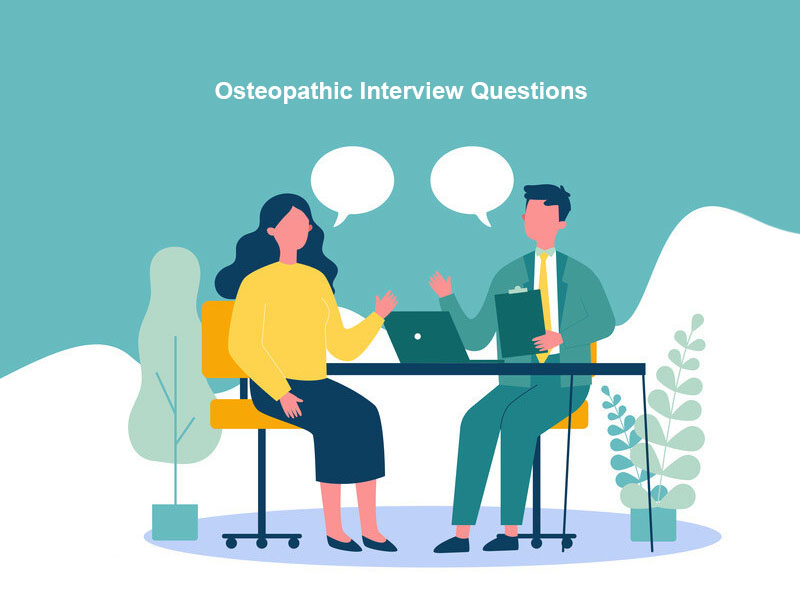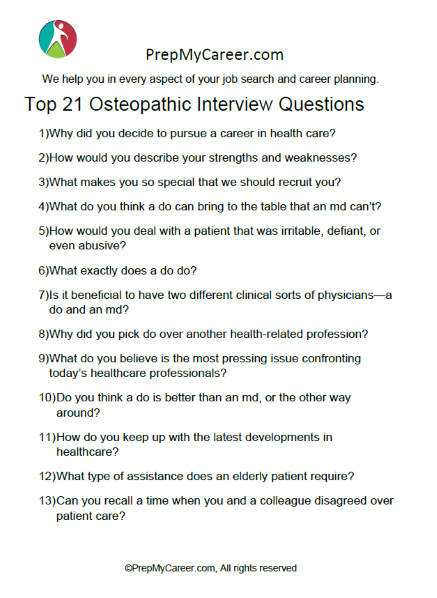Disclosure: This post contains affiliate links, which means we may earn a commission if you purchase through our links at no extra cost to you.
Osteopathic medicine is the field of medicine that assists to maintain good and improved health by focusing on the improvement of overall health and preventing disease. It is a treatment that is done without the use of drugs or medicines, it is a non-invasive manual treatment that manipulates and strengthens the musculoskeletal structure to promote health throughout all bodily systems.
The hinge, muscles, and backbone will be the focus of an osteopathic physician. The goal of therapy is to improve the neurological, vascular, and lymphatic systems of the body.
Osteopathy is a type of supplementary medicine. It’s used in conjunction with other treatments to help people feel better.

The Top 21 Interview Questions To Prepare Well
1. Why did you decide to pursue a career in health care?
Sample Answer
When I was a teen, my father was seriously ill, and I spent the majority of my leisure time caring for him. I must admit that I was astonished by how rewarding that was for me. Even though I skipped a lot of social gatherings, it inspired me to deliver the same degree of care to others, something I’ve done throughout my profession.
2. How would you describe your strengths and weaknesses?
Sample Answer
One of my biggest assets is my ability to work well with others. I’m also a self-starter who picks things up quickly. Whatever assignment I undertake, I always give it my all and complete it carefully and well ahead of schedule.
My weakness is that I’m still practicing how to perfect people skills while meeting new people. When I’m chatting with new people, I get uncomfortable. I’ve been working on this for quite some time, and I can confidently state that I’ve made a great improvement.
3. What makes you so special that we should recruit you?
Sample answer
I’m a good fit because your goal of keeping the patient first is exactly how I believe all health care should be delivered. Furthermore, my experience of dealing with underserved people has provided me with the benefit of being familiar with a wide range of viewpoints.
Finally, my experience serving on committees will contribute to your company’s dedication to effective internal management.
4. What do you think a DO can bring to the table that an MD can’t?
Sample Answer
DOs and MDs have distinct mindsets that are not comparable. Both are just different ways of getting to the same place: patient wellbeing. Prioritization for a more natural method is the distinction on the DO side, which interlocks with an MD strategy when required. This is more of a cooperative than a competitive relationship.
5. How would you deal with a patient that was irritable, defiant, or even abusive?
Sample Answer
It’s natural if a patient has a bad temper, but it might make things awkward at times. That is something I understand, and any competent physician should as well.
However, if the situation gets worse I draw the line at overt mistreatment, not for myself I can handle it but for others, such as support staff who are always ready to help us.
6. What exactly does a DO do?
Sample Answer
A doctor of osteopathic medicine is a physician who provides health care that includes treating symptoms and educating the patient about disease prevention. A DO uses techniques such as spinal manipulation and massage treatment to aid in self-healing.
7. Is it beneficial to have two different clinical sorts of physicians—a DO and an MD?
Sample Answer
The two degrees approach challenges from two separate perspectives. There’s a lot of imbrication, and in those cases, whether an MD or a DO will prove helpful; however, there are situations where one approach will provide better treatment than the other.
Possessing both types of physicians is an advantage for any treatment center that is required to accept all patients seeking treatment.
8. Why did you pick DO over another health-related profession?
Sample answer
I’m excited about osteopathic medicine because I believe it provides physicians with a one-of-a-kind, holistic approach to patient treatment. Osteopathic doctors have a wider perspective on care than other, more specialized fields of medicine since they comprehend how all of the body’s systems interact.
I admire how doctors who specialize in diverse fields of medicine can collaborate to help their patients. I feel that osteopathic doctors serve a critical role in bringing together diverse branches of medicine to provide a comprehensive approach to patient care that helps both patients and doctors
9. What do you believe is the most pressing issue confronting today’s healthcare professionals?
Sample Answer
The absence of skilled doctors and nurses in rural and underprivileged areas, in my opinion, is the most important issue in contemporary healthcare. As deaths from curable illnesses become more widespread, I believe the need for adequate healthcare in these areas will continue to grow.
Medical practitioners, in my opinion, should make it a priority to provide care to those who live in less approachable places.
10. Do you think a DO is better than an MD, or the other way around?
Sample Answer
I believe that being a DO is better for me than becoming an MD since I prefer a holistic approach, but this does not imply that it is superior. The various techniques advocated by each are not lost on me. I simply prefer the DO method. I would have been content as an MD, but I am more content as a DO.
11. How do you keep up with the latest developments in healthcare?
Sample Answer
I believe that education in the healthcare profession never truly stops. Staying informed about new advances in our sector is an important element of our profession.
As a result, I subscribe to several scientific periodicals, including health news from various sites, and I enroll in continuing education classes at a local university.
12. What type of assistance does an elderly patient require?
Sample Answer
I enjoy assisting elderly individuals in achieving their independence by giving the best physical therapy. Because they are lonely, I believe it is equally important to interact with them and offer nice company throughout my shift. I give my older patients the attention they need.
13. Can you recall a time when you and a colleague disagreed over patient care?
Sample Answer
I disagreed with the main physician on a drug that he provided for a patient. I objected since I’d read the research that listed several criteria that made prescribing dangerous. At first, I hesitated, but it was important for the benefit of the patient so I approached the main physician to share my findings because the patient had numerous of these identical issues. The main physician understood why I was first hesitant, and we talked about other options for the patient.
14. What will be your action if you have an emergency while treating another patient?
Sample Answer
I was recently performing a post-operative check-up on a patient when some other patient down the hall suffered cardiac arrest. The patient I was now treating needed to be seen, but it wasn’t an emergency.
I swiftly indicated to them that I will either return to them after examining the issue or send my PA or one of our nursing staff to help them complete their visit.
15. Consider the situation where you need to break unpleasant news to a patient about their health. What would you do if you were in this situation?
Sample Answer
First, I would acquire all clinical data to ensure that I was prepared to respond to their queries. If there are other relatives there, I would introduce myself to them all and ask if the patient wishes to learn the results alone or if their relatives are welcome to stay.
I’d like to begin by expressing my regret for the awful news. I would convey the matter plainly and without jargon to ensure that everyone understands.
I understand that it’s critical to give patients and their loved ones time to assimilate information, so I’d hold off on repeating vital facts and writing them down for the patient. And I would make sure everything is clear and what we can expect shortly.
16. As a healthcare professional, how do you hope to make a difference in the world?
Sample Answer
As a healthcare worker, I aspire to make an impact in the community by providing clinical services that are more affordable to our society’s underprivileged groups.
I want to locate volunteer possibilities in community clinics and isolated regions where people don’t have access to even basic medical treatment.
17. How do you deal with tough situations?
Sample answer
I believe I am capable of handling tough situations. First, I assess the issue to determine what is within my power and what I can immediately take control of. Then I devise a plan to get everything in order. When I’m feeling very anxious, I turn to music to help me relax.
18. What has been your biggest professional blunder or failure?
Sample answer
About five years ago, I learned the hard way how to handle night shifts. I was so used to handling day shifts that I didn’t realize there was a complete night shift culture I didn’t know about.
But I listened attentively to my more experienced coworkers and did some serious soul-searching about how I could improve my management skills. My first 3 months were difficult, but after making a few crucial improvements, I began to enjoy that job.
19. Are you at ease among those who are terminally ill? Would you be able to bear witness to a death?
Sample Answer
I recognize that working with people who are terminally ill is a necessary aspect of the profession.
I’ve witnessed a patient’s death, although it’s always devastating when we can’t save others, it’s a part of human life. I’ve worked in hospitals for over ten years and am capable of handling it.
20. How would you handle a situation in which you lacked resources or were short-staffed?
Sample Answer
In my last employment, I made sure we never ran out of supplies. After discovering that the facility lacked a supply chain, I put one in place and took this on myself to order more whenever a specific commodity ran out. I once had to cope with a staffing problem in which we were short of 3 people and couldn’t locate someone to fill their shifts.
My teammates and I had to stay on our feet and keep focused that day. After that tense shift, I talked with my manager to make sure that necessary steps were taken to ensure that something similar should not happen in the future, and it didn’t.
21. What would you do if your boss or a coworker urged you to do something illegal?
Sample answer
I have a rigorous sense of morality and believe in performing the right thing, so I wouldn’t do anything illegal. A coworker at my previous employment requested that I create a medication for medication so that he might sell it to his buddies.
He was reported to the supervisor, who dealt with him. I do not want to do anything that could bring harm to someone. I place far too much emphasis on my profession and the well-being of others.
Download the list of questions in .PDF format, to practice with them later, or to use them on your interview template (For Osteopathic interview):

 Elara Bennett
Elara Bennett
